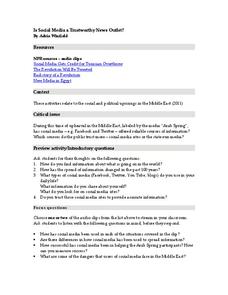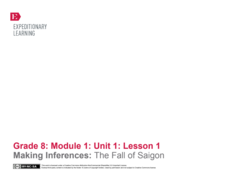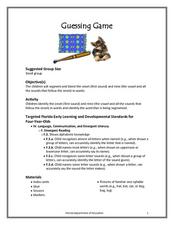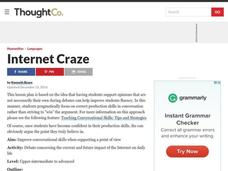One Hen
Making Choices
When choosing what foods to eat, there are a lot of factors to consider. To help make the decision a little easier, young learners work in small groups developing short plays, stories, or advertisements that address the different issues...
University of Pennsylvania
Decoding Propaganda: J’Accuse…! vs. J’Accuse…!
Reading snail mail is a great way to go back into history and to understand others' points of view. The resource, the second in a five-part unit, covers the Dreyfus Affair. Scholars, working in two different groups, read one letter and...
Curated OER
Rhetorical Devices in a Primary Source
Analyze Martin Luther King Jr.'s famous and powerful "I Have a Dream" speech as a primary source document. After reading up on rhetorical devices and working in small groups to define terms, class members identify and explain the use of...
Curated OER
Is Social Media a Trustworthy News Outlet?
Examine the role of social media in social and political uprisings. Pupils listen to NPR audio clips about social media and the Arab Spring and read an article that proposes the idea that revolution will not happen through social media....
Utah Education Network (UEN)
Keyboarding - Correcting Capitals Proofreading
Work on proofreading and editing a document with this keyboarding lesson plan.Youngsters are given a text with no capital letters. They proofread and retype the document adding capitals when necessary. This is designed for a keyboarding...
University of Pennsylvania
From the Dreyfus Affair to the World Today
Historical events do not occur in a vacuum. Such is the case of the Dreyfus Affair, where the connection between Captain Alfred Dreyfus, Emile Zola, and Hannah Arendt is fused by the events of the early 20th century. The informative...
University of Pennsylvania
Mock Trial of Alfred Dreyfus
What if scholars based mock trials on history? The fourth installment of a five-part series on the Dreyfus Affair asks learners to read various pieces of evidence before conducting a mock trial for a French officer. Teams answer...
iCivics
Students, Engage!
Discuss as a class some problems that you would like to see changed in your school or community, and then take action! After your young citizens determine the appropriate steps they should take to accomplish their objectives, they will...
Pearson
The Simple Present: Affirmative and Negative Statements
The present tense is a helpful skill to review in any language arts classroom. Focusing on statements made in the affirmative and in the negative, a slideshow presentation guides pupils through grammar rules and examples for the simple...
Pearson
Subject and Object Pronouns; Direct and Indirect Object
Replacing a gift can end up in an awkward moment—but not when replacing a noun with a pronoun! Watch the most effective ways to use subject and object pronouns, as well as direct and indirect object pronouns, with an entertaining grammar...
Pearson
Non-Action Verbs
A verb is something you do — but can you always see the action? Use a slideshow presentation to clarify the differences between verbs that describe actions, and verbs that describe senses, preferences, and emotions.
EngageNY
Making Inferences: The Fall of Saigon
Get hooked! Reel in and hook scholars to the unit with a slide show, text-based activity, and reading exercises. To increase curiosity, learners read only small pieces of Panic Rises in Saigon, but the Exits Are Few. Readers use the...
Curated OER
The Earth's Layers: Day 6: Landforms II
Students closely examine the earth's crust and various landforms. In this Earth's layers lesson students work in cooperative groups and analyze their roles and responsibilities therein. Each group is assigned a specific landform to...
Curated OER
Mineral Identification
Students investigate the environment by examining mineral characteristics. In this mineral lesson plan, students perform scientific observations in groups in which they identify minerals found in everyday objects by using a worksheet. ...
Curated OER
Guessing Game
Students participate in a set of activities designed to help ESL students become familiar with the English language through description, group work, oral reading, and question/answer sessions.
British Council
What's Your Name?
What is your name? Scholars join in small groups to discuss questions about their names and listen to an audio about names before completing a worksheet. Afterward, individuals create a list of names heard in the audio and classify them...
Curated OER
Rehearsing the Fashion Show
Students edit written work about a fashion show. In this fashion show lesson, students write a presentation piece and works in groups of 4,6, or 8 to edit what they have written. Students rehearse by pair sharing and give their short...
Curated OER
Sample Lesson 1: Is This Source Credible? Useful? Why and Why Not?
Build background knowledge for The Book Thief by Markus Zusak while teaching your pupils how to determine the credibility of online sources. The plan is designed to take place over the course of two days. On the first day, model how to...
EngageNY
Evaluating an Argument: The Polyface Local Sustainable
Who has the better argument? Class members work in small groups to compare the arguments on the Example of Strong and Flawed Arguments sheet. They then analyze Michael Pollan’s argument on pages 161–166 of The Omnivore’s Dilemma and...
Azar Grammar
Students as “Grammarians”: Discovering Grammatical Rules Lesson on the Causative “Have”
Groups examine a series of examples, identify the common elements, and work together to discover "the causative" grammar rule represented.
Curated OER
Conversation Lesson: Internet Craze
Learning to support your opinions, debate, build arguments, and effectively respect another's point of view are vital skills. Learners work through a series of topics to practice discussion engagement and verbal communication.
Curated OER
Forensic Colloquium Experience: Debating the Issues
Pupils prepare for an participate in a debate. They watch instructional videos on how debates proceed. Pupils work in teams to research various topics, present their opinions on the issue, and respond to opposing viewpoints during a...
Curated OER
Editing
Explore the writing process by reviewing previously written work. First, middle schoolers analyze a handout in which they must read the text and correct the mistakes with an editing checklist. They proofread their editing and share their...
Curated OER
To Quote or Not to Quote
Introduce your middle and high schoolers to the correct use of quotation marks. They identify examples of correct and incorrect quotations in magazines and edit a paragraph in groups. Use this activity as a way to reinforce proofreading...
Other popular searches
- Cooperative Group Work
- Small Group Work
- Modeling Group Work
- Group Work Maths
- Group Work Rubric
- Group Work Lesson Plans
- Group Work Language Arts
- Group Work Dna
- Group Work Poverty
- Grading Group Work
- Group Work Peer Evaluation
- Cooperative Group Work Math

























